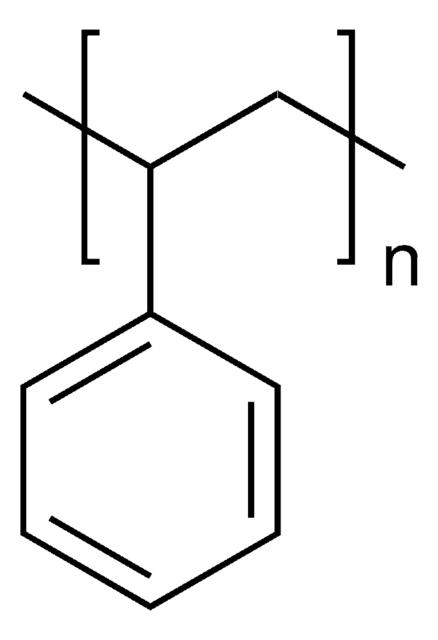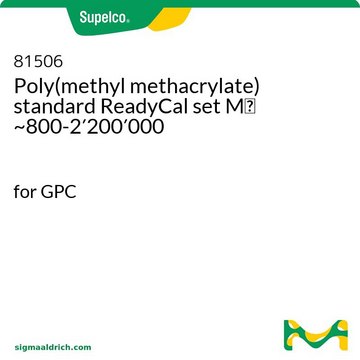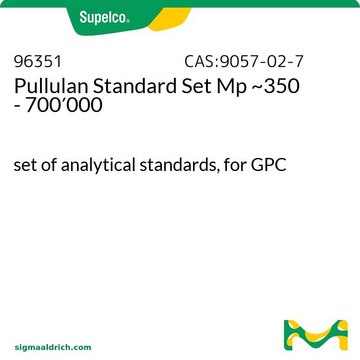76552
Polystyrene (low molecular) Standard ReadyCal Set M(p) ~250-65000
for GPC
Iniciar sesiónpara Ver la Fijación de precios por contrato y de la organización
About This Item
Código UNSPSC:
41116107
NACRES:
NA.24
Productos recomendados
grado
for GPC
Nivel de calidad
caducidad
limited shelf life, expiry date on the label
técnicas
gel permeation chromatography (GPC): suitable
formato
neat
temp. de almacenamiento
2-8°C
Aplicación
- Low molecular weight polystyrene standards for gel permeation chromatography: The characterization of branched ultrahigh molar mass polymers using asymmetrical flow field-flow fractionation and size exclusion chromatography highlighted the essential role of low molecular weight polystyrene standards in determining polymer distribution and characteristics, contributing significantly to advances in polymer science research (Otte et al., 2011).
Componentes
ReadyCal Standards are polymer cocktails pre-weighed into autosampler vials for the convenient calibration of GPC/SEC/GFC systems.
This kit contains 10 sets of 3 color-coded vials, each containing four polystyrenes of different molar masses. Molar masses range from ~266 to ~66,000 Da and are carefully selected so that polymer traces are baseline separated.
Sufficient material provided for at least 10 calibrations.
Suitable for calibrations in THF, toluene, DMF, DMAc, chloroform, TCB, DCB and NMP.
This kit contains 10 sets of 3 color-coded vials, each containing four polystyrenes of different molar masses. Molar masses range from ~266 to ~66,000 Da and are carefully selected so that polymer traces are baseline separated.
Sufficient material provided for at least 10 calibrations.
Suitable for calibrations in THF, toluene, DMF, DMAc, chloroform, TCB, DCB and NMP.
Código de clase de almacenamiento
11 - Combustible Solids
Punto de inflamabilidad (°F)
No data available
Punto de inflamabilidad (°C)
No data available
Elija entre una de las versiones más recientes:
¿Ya tiene este producto?
Encuentre la documentación para los productos que ha comprado recientemente en la Biblioteca de documentos.
Los clientes también vieron
Barbara De Meester et al.
Nature communications, 11(1), 5020-5020 (2020-10-08)
Lignin causes lignocellulosic biomass recalcitrance to enzymatic hydrolysis. Engineered low-lignin plants have reduced recalcitrance but often exhibit yield penalties, offsetting their gains in fermentable sugar yield. Here, CRISPR/Cas9-generated CCR2(-/*) line 12 poplars have one knockout CCR2 allele while the other
Nuestro equipo de científicos tiene experiencia en todas las áreas de investigación: Ciencias de la vida, Ciencia de los materiales, Síntesis química, Cromatografía, Analítica y muchas otras.
Póngase en contacto con el Servicio técnico





